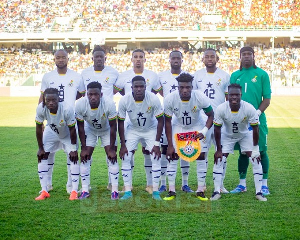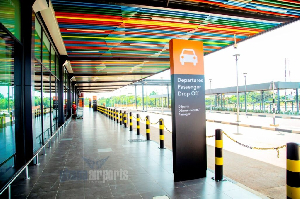The risk of exercising the right to education as enshrined in the 1992 Constitution of the republic of Ghana is more than the benefits of the same right for children of the Bujaii Community in the East Gonja District of the Northern region.
Numbering about 114, the children are being guided by just three teachers who alternate between class 1 and class 4.
They [the pupils] have to endure the pain of constantly sitting in the open to gaze at tiny blackboards positioned in front of them as instructional materials.
They do so in their tattered old uniforms of which some are without the right shorts to match, and it is under these trees that the students, including Muhammed Aremeyaw, hopes his dream of becoming a teacher will be realised someday.
“I want to be a teacher…,” he told our reporter (Kwaku Nti) in a shaking voice when he approached him at his class four classroom which location was not far from the other remaining classes including a Kindergarten where the young ones are kept for instruction.
Until 2009, when the Presby Church in the community decided to put up a makeshift structure to serve as a centre for the education of the children born in this village of about seven hundred inhabitants headed by a local chief, children from the Bujaii community had to walk across a low-lying concrete bridge to school at the Kpandu village which unfortunately had same facilities.
“And crossing over the bridge was also a very tiresome one as most villagers lost their lives during the raining season when the river overflown its banks…,” Member of Parliament (MP) for Salaga North constituency, Alhassan Mumuni, in whose jurisdiction Bujaii and several other communities fall told Today.
Hon. Mumuni, who until his election as the MP for the area was the Municipal Chief Executive (MCE) for the East Gonja District, recounted that he witnessed the death of three (3) residents in Bujaii in the river and claimed to have been told of the death of other seven local indigenes at the same location.
He pointed out that through his instrumentality; the government has voted funds for the continuation of a steel bridge which is currently being worked upon by Ucom Construction to enhance movement of persons and goods and also for agriculture purposes.
However, the completion of the bridge can certainly not be a complete solution for the plights of the indigenes whose votes, politicians solicit for every four years.
“They need more than a bridge…,” I said to myself as I had to jump out of the luxurious Land Cruiser vehicle of the MP and wallowed through stagnant waters and mounted a motorbike en route to the Bujaii community where the children in their tattered uniforms were in class.
My opinion was not far from right as the chief of the village, Bujaii Naa Zackaria Kpandu, questioned whether it was fair for politicians to ignore them but travel for their votes every four years.
“My brother, each election year they come here for our votes but look at our plight—no drinking water, no hospital or clinic and virtually no social amenities….is it fair, I ask is it fair…?” he asked me angrily.
To him, he and his subjects who do not have electricity are being treated like ‘animals who are uncared for when needed, dumped and gone but remembered anytime there are elections.”
He thus poured out his frustration and confessed that he and his subjects in the community which is filled with mud houses and roofed with thatch will ‘advise themselves when the time for voting comes.’
The chief’s complaint was shared by the headmaster of Bujaii Presby Primary, Frank Soale Zackaria, who said the seeming non-functional approach of the education office, when they approached it for development, forced the community members to put up a make-shift structure to accommodate their children.
The worn out two -mud structures he pointed to as the cradle of education in the village was no more in use.
The school had been forced to relocate under trees where the children struggle with stray animals for seating places.
“For now, classes three and four had to be permanently under trees as you can see, the classroom is not big enough to accommodate all…,” the headmaster of the school said.
Apart from Mr. Zackaria who holds a diploma in education from the Bagabaga College of Education in Tamale, the other two teachers, he described as ‘volunteers’ have no formal education as teachers.
Of the other two volunteers, including an indigene from the Bujaii community, one is at the early stages of training at the Mampong College of Education in the Eastern region, while the other is a Senior High School (SHS) leaver.
The headmaster explained that the lack of social amenities and the distance between the Bujaii community and Tamale are part of the reasons why teachers refuse postings to the community.
Hope, he said, was in sight for the poor school children as he and some opinion leaders of the town including the chief and the MP, have appealed to the Ghana Education Trust Fund (Getfund) for the provision of a six-unit classroom block.
But the question is: Will the provision of a classroom block for the community in some unknown years to come be the panacea for the community and possibly lead to the provision of more development infrastructure in the community?
Regional News of Thursday, 8 May 2014
Source: todaygh.com
















